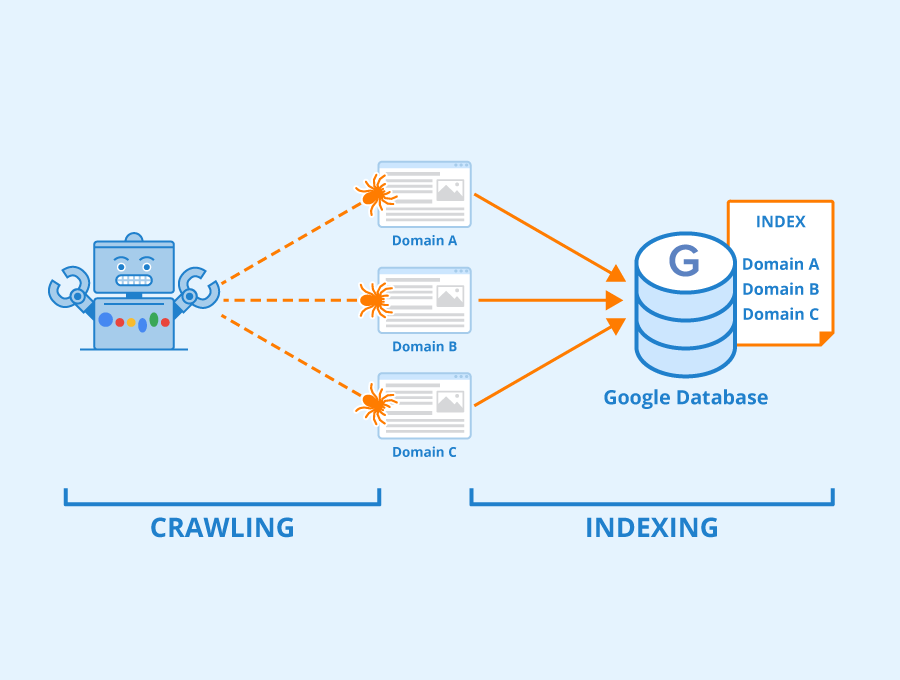A content creator aims to develop informative content with the conviction that their audience will find it on the World Wide Web.
This is possible, however, if search engines like Google and Bing discover and display your informative content to your target audience, which ultimately helps to:
- Boost your website visibility
- Market and grow your business
- Maximize your product and services sales
One common thing search engines do is to provide answers to the questions people are searching for online. Consider this: People find solutions online by typing search terms (such as a keyword or a phrase) into search engines.
On the other hand, search engines scan through their index (Search Engine repository) to display possible solutions to the user’s query. Answers on top of any search engine list are deemed authoritative and trustworthy.
Now, let’s delve deeper into how search engines work to provide readers with reliable and accurate solutions. They adhere to three distinct processes: crawling, indexing, and ranking.
Let’s Figure out What’s Crawling
Crawling is the ability for search engines to discover any new or updated content on the web. Crawling allows the search engine to display relevant results when a user performs a search query.

Source: Haywood Beasley
How Do Search Engines Crawl Your Web Pages?
Search engine employs crawlers (also known as ‘spiders’ or ‘bots’) to rummage through content on the World Wide Web. A bot uses specific algorithms to crawl new or updated content by first locating a few web pages and then following every link on those pages.
By doing so, search engine bots discover billions and billions of related content (webpages, videos, pdf, or any other form of content).
It can take some time for a search engine spider to crawl the entire website. Crawls from search engines like Google take days or weeks to complete.
Do Search Engines Crawl All Your Web Pages?
Search engines are likely to crawl some, but not all, webpages online. Ideally, they start by crawling the most authoritative and trustworthy web pages, then follow the links on those pages to broaden their search across the web.
Think about this scenario. You own a blog or a website, but it doesn’t appear on search results even after keying in keywords or phrases related to your niche on search engines. You might be wondering what the problem is. There are a few reasons why:
- Your website is still new and has yet to be discovered by search engine crawlers.
- You might not have properly optimized your website, making it difficult for robots to crawl.
- Sometimes you can block search engines (by using crawler directive codes) from crawling your website knowingly or unknowingly.
- To be crawled, your website must be linked to reliable, trustworthy, and authoritative external websites.
It is also essential to realize that if your content is protected, search engines may be unable to crawl it. Users must sign up or fill out a form before they can access protected content.
Now that you know what crawling is, how search engines find your content, and what you can do to optimize your website for crawling, the next step is to make sure your web pages can be indexed.
How Do Search Engines Organize Content or Information?
After the website has been crawled and deemed suitable for consumption by the intended audience, the next thing is to store that information in the database (Index). The process of storing crawled information in a database is what we call Indexing.

Source: seobility
How Do Search Engine Index Your Content?
Think of a search engine database as an index in a book. An index in a book is located at the back of the book and lists all topics covered and the page number on which each topic can be found.
Once your site has been crawled, search engines will analyze each webpage’s information, extract its relevant information, such as keywords, images, and Meta tags, and then list them according to search terms.
Can Search Engines Remove Pages From Their Index?
Search engines can remove your page from their indexes. Page removal may occur due to various reasons, including:
- Your page may be no longer exist, or it has been deleted
- You might have violated search engine guidelines leading to your website being penalized
- Probably your page is blocked by adding a “no index” meta tag.
- You might have moved or changed your page, leading to broken links
- A search engine hasn’t recently crawled your website
It is important to note that if your page is removed from a search engine index, it may take some time for the removal to be reflected in search results.
Let’s Look at How Search Engines Rank Web Pages
Whenever you need a solution, you usually turn to a search engine. For example, if you key in a search term on Google, a list of web pages will appear.
That means all the web pages listed are related to your search term though some are on top (most relevant) and others at the bottom (least relevant) of the list.
How Do Search Engines Establish Which Web Page Is the Most Relevant?
A search engine uses complex algorithms to determine the relevance and authority of your web pages and then ranks the pages in the search results accordingly.
Search engines consider various factors to rank web pages. Considerations include off-page and On-page SEO factors. Off-page SEO factors include social media signals, number of backlinks from authoritative websites, brand reviews, domain age, and domain history.
On the other hand, on-page SEO factors may include content quality and relevancy, user experience, clear and authoritative title and header tags, keyword usage, and keyword density.
After all, the goal of ranking web pages on search engines is to improve the visibility of a web page in search results while also driving traffic to the website.
To wrap things up, you do not need to know the ins and outs of how search engines work, but by now, having gone through this article, you will acquire baseline knowledge on how search engines crawl, index, and rank your web pages.

